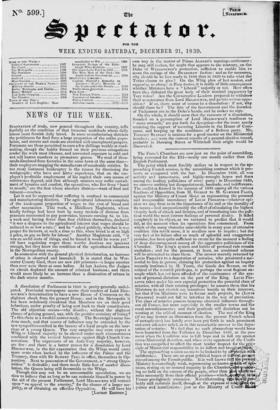A dissolution of Parliament in 1840 is pretty generally antici-
pated. Provincial newspapers assure their readers of Lord MEL- BOURNE'S determination to have a new House of Commons on the slightest check from the present house; and in the Metropolis it has been sedulously circulated that Members are on their good behaviour, under penalty of being sent back to their constituents. The old objection occurs—why dissolve, without the slightest chance of gaining ground, nay, with the positive certainty of losing ? To this there is a twofold answer ready. The Sovereign's name has done much, and that source of influence may be extended by the new sympathies excited in the breasts of a loyal people on the mar- riage of a young Queen. The very sanguine may even expect a Whig or Liberal majority to be elected under such circumstances combined with the revived bitterness against High Church Con- servatism. The expectants of an Anti-Tory majority, however, are few : and there is a better reason for a dissolution by Lord MELBOURNE, in the fair expectation that the Whigs would carry more seats when backed by the influence of the Palace and the Treasury, than with Sir ROBEIIT PEEL in office, themselves in Op- position. Next to possession of the Government, a "strong Oppo- ssition" is desirable ; and there needs little fear of another disso- lution, the Queen being still favourable to the Whigs. Though this may not be an unreasdealfle speculation, we are slow to believe that as long as he can maintain himself in power by the aid of the present Parliament, Lord MELBOURNE Will venture upon "an appeal to the country," for the Chance of a larger ma- jority, or of obtaining an effechse Opposition. He will have his own way in the matter of Prince ALBERT'S marriage-settlement : he may still reckon, for aught that appears to the contrary, on the Duke of WELLINGTON'S protection, sufficient to enable him to scorn the ravings of the BRADSHAW faction : and as for measures, why should he be less ready in 1840 than in 1839 to take what the Tories choose to give ? On the Whig plan of last session, and supposing 720 Change in Tou tactics, it is really of little consequence whether Ministers have a "Liberal" majority or not. How often have they defeated the great body of their nominal supporters by Tory votes! Are the Conservative Leaders prepared to withdraw their countenance from Lord MmaiounxE, and go into serious oppo- sition ? If so there must of course be a dissolution : if not, why should there ? The fate of the Government and the duration
of Parliament are in the Duke's hands, and he makes no sign. •
On the whole, it should seem that the rumours of a dissolution, founded on a presumption of Lord islinaioraNE's readiness to " move onwards," are put forth for deception—for the more surely retaining the support of wavering Liberals in the House of Com- mons, and keeping up the semblance of a Reform party. Mr. Treasuu STANLEY is anxious for a good muster on the Ministerial benches ; and were the current reports of a general election traced, probably in Downing Street or Whitehall their origin would be discovered.


























